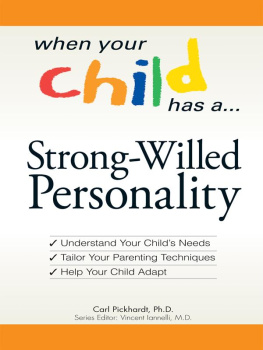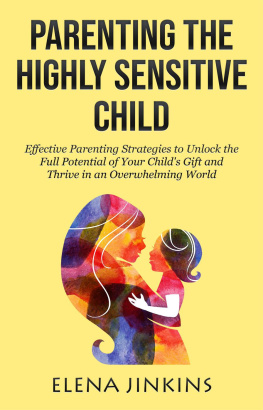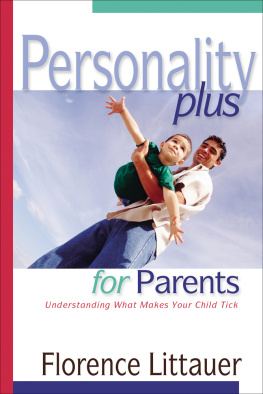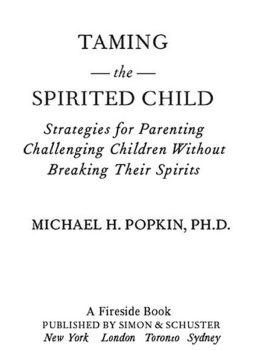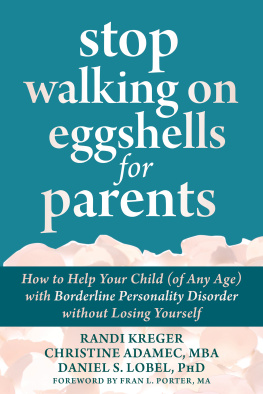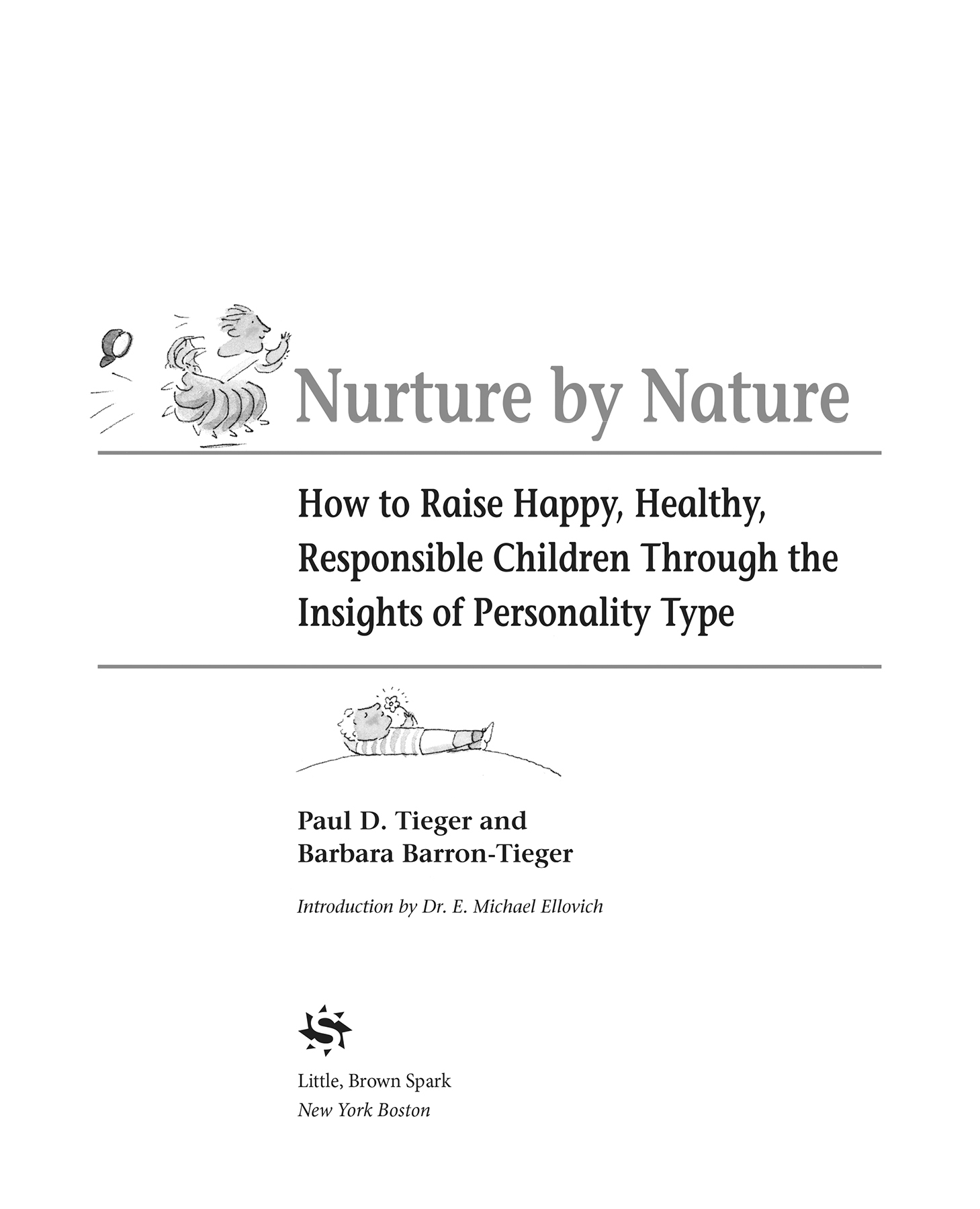
Copyright 1997 by Paul D. Tieger and Barbara Barron-Tieger
Introduction copyright 1997 by Dr. E. Michael Ellovich
Illustrations copyright 1997 by Merle Nacht
Hachette Book Group supports the right to free expression and the value of copyright. The purpose of copyright is to encourage writers and artists to produce the creative works that enrich our culture.
The scanning, uploading, and distribution of this book without permission is a theft of the authors intellectual property. If you would like permission to use material from the book (other than for review purposes), please contact permissions@hbgusa.com. Thank you for your support of the authors rights.
The authors are grateful for permission to include the following previously copyrighted material:
Excerpt from The Prophet by Kahlil Gibran. Copyright 1923 by Kahlil Gibran and renewed 1951 by Administrators CTA of Kahlil Gibran Estate and Mary G. Gibran. Reprinted by permission of Alfred A. Knopf, Inc.
Little, Brown Spark
Hachette Book Group
1290 Avenue of the Americas, New York, NY 10104
littlebrownspark.com
facebook.com/littlebrownspark
twitter.com/lbsparkbooks
Instagram.com/littlebrownspark
First ebook edition: March 2010
Little, Brown Spark is an imprint of Little, Brown and Company, a division of Hachette Book Group, Inc. The Little, Brown Spark name and logo are trademarks of Hachette Book Group, Inc.
The publisher is not responsible for websites (or their content) that are not owned by the publisher.
ISBN: 9780759524262
E3-20191220-JV-PC-COR
Contents
Dedicated to Daniel and Kelly,
the light, joy, and eternal blessing of our lives
Your children are not your children.
They are the sons and daughters of Lifes longing
for itself.
They come through you but not from you, And though they are with you yet they belong not
to you.
You may give them your love but not your thoughts,
For they have their own thoughts.
You may house their bodies but not their souls,
For their souls dwell in the house of tomorrow,
which you cannot visit, not even in your dreams.
You may strive to be like them, but seek not to
make them like you.
For life goes not backward nor tarries with yesterday.
You are the bows from which your children as
living arrows are sent forth.
The archer sees the mark upon the path of the
infinite, and He bends you with his might that
his arrows may go swift and far.
Let your bending in the Archers hand be for
gladness;
For even as He loves the arrow that flies, so He
loves also the bow that is stable.
The Prophet
Kahlil Gibran
This book exists because of the generous contributions of hundreds of people. It is with heartfelt gratitude that we acknowledge the time, insights, and valuable life experiences shared by the hundreds of parents interviewed for this book. While space and the promise of anonymity prohibit us from listing all of their names here, we wish to recognize some of the extraordinary people who gave above and beyond the call of service and friendship. They willingly spent hours of their precious time to be interviewed, participated in group discussions, and provided invaluable assistance tracking down parents with children of certain types when we were in dire need of them. Those people included: Keats Jarmon, Marsha Serling Goldberg, Carla Laughlin, Nicki Bredeson, Gordon Lawrence, Jean Kummerow, Georgiane Lussier, Barbara Brown, Lesley Schurmann, Mary Miner, Sue Scanlon, Daniel Oppenheim, Sue Piquera, Tom Carskadon, Jamie DeLong, Jerry Macdaid, and Beatrice Kallungal. To them, and to the hundreds of other parents who shared their stories about the joys and challenges of raising their children, we thank you and wish you and your families every happiness. It was an honor, blessing, and privilege to get to know your children through you and to learn from your experiences.
We also recognize and are grateful to all those who have added immeasurably to our understanding of Personality Type over the years, including Mary McCaulley, Gordon Lawrence, Terry Duniho, and Naomi Quenk. Thank you also to Jane Richards-Jones for her reassuring and practical advice about parenting adolescents and for her referral to many of the helpful books on the subjects listed in the back of this book.
We thank our editor, Geoffrey Kloske, for his skillful polishing, organizing, tightening, and incisive analysis and Betty Power for her careful copyediting. We are forever grateful to our dear friend and literary agent, Kit Ward, for her advice, support, enthusiasm, and creative guidance. Her encouragement and excitement helped propel us out of the dream stage, and her energy and expertise helped us turn this idea into a book we are honored to write.
We especially thank our wonderful friends and loving families for their support and encouragement. Especially we thank our sister Deborah Barron, whose love and honesty have gently helped us discover so much of the truth about ourselves as parents. And we honor and bless our parentsthose here with us in this world and those forever with us but waiting in the next. We thank them for their love and abiding faith.
And most of all, we thank our children for being the ultimate teachers of profound truths as we struggle to be good parents. For their ideas, reactions, opinions, and encouraging notes, we thank you. Danny and Kelly, we are eternally grateful for your amazing love and patience during the busy days of interviews and writing. We believe we were given the children we needed in order to learn what we are here to learn. Thank you for choosing us.
Recently, a mother of two children came to me for help. Like many parents, she was having trouble figuring out how best to meet her childrens vastly different needs. Looking for ways to reduce the often pressured and sometimes unhappy start to their day, she had tried the advice of a child care specialist on a morning news program. She created a checklist of steps to be taken by family members each morning. Her plan had a positive effect on her younger child, who eagerly adhered to the new steps to get ready on time, but it had quite the opposite effect on her older child. The older child thought she was crazy and went on to question and resist each step in the new morning plan. He felt overwhelmed by the pressure of too many added expectations. While he tried to comply for a few days, he would eventually collapse into tears on the way to the car.
Despite her tried and true parenting technique, the mother was not really surprised that her children had such totally opposite responses. How many times had she in fact described them as different as the proverbial night and day? And yet, she tried to follow her own mothers advice to always be fair and consistent with her children. But the only real and lasting peace in her household would come from developing a morning routine that fit each child. In order to really parent each child lovingly, she must respond to each childs needs, rather than demand both children act like the same person. The only really effective parenting, she concluded, was individualized parenting. By addressing the needs of each child, she could begin to nurture and parent them in the way she wanted and they deserved. How simple, yet how profound.
Individualized parenting. How different that concept is from that embraced by previous generations of parents. Not so long ago, the benchmark of good parenting was indeed a steady combination of consistency and strictness. Parents judged themselves against an outside standard that said, in essence, the more the children were molded into little versions of the parents, the better. Being considered a good mother or a good father was based on how well your child behaved. This was a model to which everyone subscribed. Little time was spent worrying about a childs happiness or emotional health. If the kids were polite, well mannered, and stayed out of trouble, they were considered successful products of good parents. The secret to good child rearing was held in the idea that the parents behavior was the most important piece of the puzzle.


